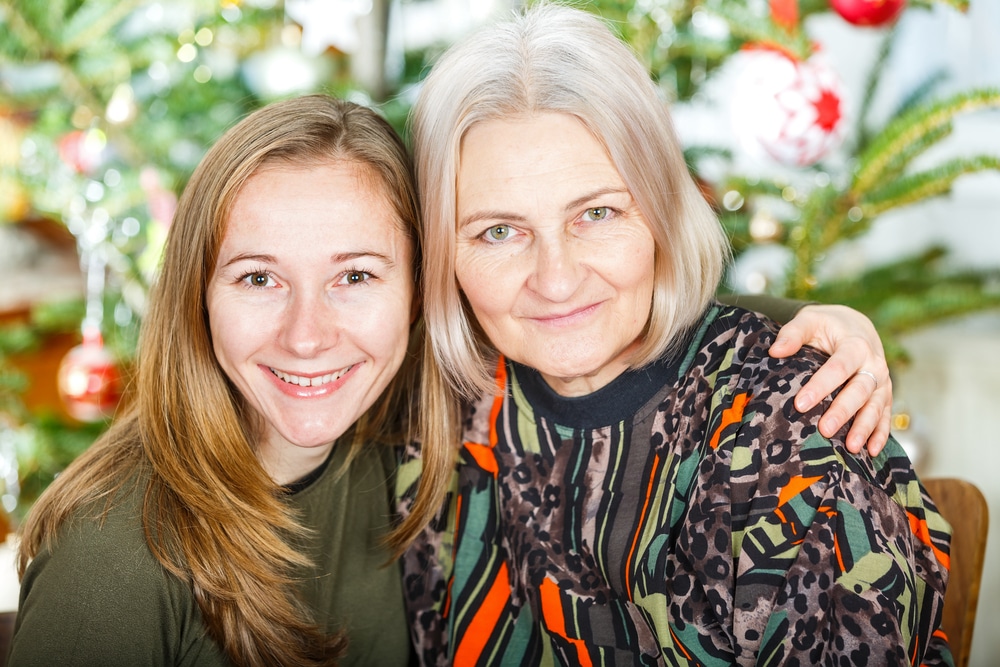If you’re thinking ahead to what you’ll be doing with your family this Christmas, you may be wondering what would be best for a person with dementia.
Christmas can be a challenging time for the person you are caring for and equally difficult for you as a carer. It will usually result in a change of routine, which is not generally good for anyone living with dementia. A regular schedule of activities or tasks tends to be a good thing for someone living with dementia and when you change the person’s schedule, it can cause confusion and be disorientating for them. You may be determined to ensure the person is not going to be alone at Christmas and you may have an idea about having the person coming to your home for Christmas dinner. However, approach this idea with caution.
My mum came to stay with me one Christmas and it didn’t go well. Despite me putting signs on doors letting her know which room was the toilet, lounge and so on, she couldn’t seem to make sense of the signs and got lost around the house. She hated being in a different environment and woke up many times in the night, unable to find the bathroom. I put a nightlight on the landing, thinking it would help her find her way to the toilet, but each time she got up, she turned it off again before she went back to bed, so the next time she awoke the house was in darkness.
On Christmas Eve, she sat on my stairs and sobbed like a little girl. She didn’t like being in a strange house. She wanted to go home. She wanted her own TV and her own sofa.
The following year, I went to her house on Christmas Day and took her out for dinner. It went very well. She liked going out to eat and enjoyed being back in the comfort of her own home to watch TV afterwards. I even stayed at a local hotel overnight so that I could visit her again on Boxing Day (she didn’t have a spare room at her house).
When planning your Christmas, think about finding the least stressful scenario for all concerned. If you plan to visit the person with dementia with other relatives, keep the number of visitors confined to small groups rather than having big family gatherings, which can be confusing and daunting for a person with dementia.
If you are cooking Christmas dinner for everyone, don’t overdo the portion sizes. The person with dementia may not have such a big appetite, so avoid piling loads of food on their plate. Keep portion sizes sufficient but not too huge.
Try to keep the noise down if you have many guests at the table. The person may find it too much.
I would personally recommend keeping the person in their home if you can so that they feel more relaxed and can stick to their usual routine.
However, if you do decide to have your loved one come to stay with you,the person does come to stay with you, they may want to go home earlier than expected. Even if they are meant to be staying overnight, then bear in mind they may change their mind and ask to go home. Make sure someone in the family hasn’t had a drink and can drive them home at short notice if they become distressed or insist on going home. Or have a local cab firm’s details to hand.
During the festive celebrations, you might want to consider how the extra noise in your house may affect the person. Louder music and more people in one room than usual, as well as lots of different conversations at once may be confusing and tiring for them. If your lounge is very busy, find a quiet room where the person with dementia can sit and read or talk to you. Ask if they would like a rest. Take them out for a walk if they normally like to do some exercise. When it comes to Christmas dinner, don’t put too much food on their plate – give them their normal portion size so that they don’t end up feeling sick or suffering from stomach problems. Avoid letting them drink too much as this can lead to arguments and naturally increase the risk of falls.
When it comes to dishing out Christmas presents, wrap their presents gently and make them easy to unwrap so that they aren’t struggling to open presents in front of relatives. And remember, the most valuable gift you can give a person with dementia at Christmas is your time.
Remember that you need a break from time to time as well. If you feel tired, ask another family member to sit with the person or accompany them on a walk.
The hardest thing for carers to remember too is that it’s supposed to be a rest time for everyone. Try to get some rest yourself and make sure you have lots of support and practical help from other family members.
